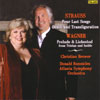Strauss (4) Last Songs; Wagner Prelude & Liebestod
Something you don’t often hear now, a ‘big voice’ Four Last Songs
View record and artist detailsRecord and Artist Details
Composer or Director: Richard Strauss, Richard Wagner
Genre:
Vocal
Label: Telarc
Magazine Review Date: 13/2006
Media Format: CD or Download
Media Runtime: 63
Mastering:
Stereo
DDD
Catalogue Number: CD80661

Tracks:
| Composition | Artist Credit |
|---|---|
| (4) Letzte Lieder, '(4) Last Songs' |
Richard Strauss, Composer
Atlanta Symphony Orchestra Christine Brewer, Soprano Donald Runnicles, Conductor Richard Strauss, Composer |
| Tod und Verklärung |
Richard Strauss, Composer
Atlanta Symphony Orchestra Donald Runnicles, Conductor Richard Strauss, Composer |
| Tristan und Isolde, Movement: Prelude |
Richard Wagner, Composer
Atlanta Symphony Orchestra Christine Brewer, Soprano Donald Runnicles, Conductor Richard Wagner, Composer |
| Tristan und Isolde, Movement: Mild und leise (Liebestod) |
Richard Wagner, Composer
Atlanta Symphony Orchestra Christine Brewer, Soprano Donald Runnicles, Conductor Richard Wagner, Composer |
Author: Mike Ashman
The “death and transfiguration” theme of this collection encompasses one of Strauss’s gaudiest tone-poems, the quotation from it embedded in “Im Abendrot” – the first-composed but last-placed of his Four Last Songs – and the title by which Wagner himself knew his favourite concert item (for him, the Prelude was the Liebestod).
Runnicles’ work in opera house and concert hall speaks for itself, but the Scot has not always matched these live achievements on disc. Here, recorded as recently as this April, Tod und Verklärung is taken quite gently, emphasising the kinship to Wagner and his contemporaries. With the Atlanta strings attempting a Viennese sweetness, the loudest pages make their points without being supercharged like those famous Toscanini performances, and the work’s overall structure is always clearly in view.
If the emotional temperature is low, a similar approach pays dividends in the Four Last Songs. Christine Brewer uses her large voice cunningly, always staying with the words – like Flagstad in the work’s premiere, Schwarzkopf (EMI) and, my favourite, Jurinac (also EMI) – rather than succumbing to vocalise tendencies. Runnicles accompanies like a fine pianist, full of subtle nudges and holds.
The Tristan excerpt is absolutely proficient, although Runnicles tends to bed down in the middle of the Prelude just where the repetitions of the theme are winding themselves up for the climax. It’s strange that he and Brewer should release a newer version of this music just a few months before their Warner set of the complete work appears.
A curate’s egg then; the interest of the record’s theme does not override the low voltage of the tone-poem and the Tristan Prelude, but Brewer’s Four Last Songs should be heard.
Runnicles’ work in opera house and concert hall speaks for itself, but the Scot has not always matched these live achievements on disc. Here, recorded as recently as this April, Tod und Verklärung is taken quite gently, emphasising the kinship to Wagner and his contemporaries. With the Atlanta strings attempting a Viennese sweetness, the loudest pages make their points without being supercharged like those famous Toscanini performances, and the work’s overall structure is always clearly in view.
If the emotional temperature is low, a similar approach pays dividends in the Four Last Songs. Christine Brewer uses her large voice cunningly, always staying with the words – like Flagstad in the work’s premiere, Schwarzkopf (EMI) and, my favourite, Jurinac (also EMI) – rather than succumbing to vocalise tendencies. Runnicles accompanies like a fine pianist, full of subtle nudges and holds.
The Tristan excerpt is absolutely proficient, although Runnicles tends to bed down in the middle of the Prelude just where the repetitions of the theme are winding themselves up for the climax. It’s strange that he and Brewer should release a newer version of this music just a few months before their Warner set of the complete work appears.
A curate’s egg then; the interest of the record’s theme does not override the low voltage of the tone-poem and the Tristan Prelude, but Brewer’s Four Last Songs should be heard.
Discover the world's largest classical music catalogue with Presto Music.

Gramophone Digital Club
- Digital Edition
- Digital Archive
- Reviews Database
- Full website access
From £8.75 / month
Subscribe
Gramophone Full Club
- Print Edition
- Digital Edition
- Digital Archive
- Reviews Database
- Full website access
From £11.00 / month
Subscribe
If you are a library, university or other organisation that would be interested in an institutional subscription to Gramophone please click here for further information.




